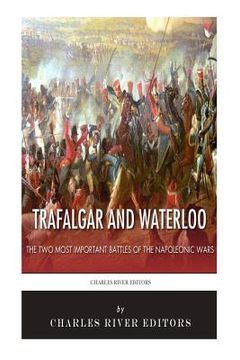Trafalgar and Waterloo: The Two Most Important Battles of the Napoleonic Wars (en Inglés)
Reseña del libro "Trafalgar and Waterloo: The Two Most Important Battles of the Napoleonic Wars (en Inglés)"
*Includes pictures. *Explains the campaigns that led to the battles and their aftermath. *Includes accounts of the fighting by some of the battles' participants. *Includes bibliographies for further reading. "England expects that every man will do his duty." - Admiral Horatio Nelson before the Battle of Trafalgar "Believe me, nothing except a battle lost can be half so melancholy as a battle won." - Duke of Wellington, at Waterloo Over the course of its history, England has engaged in an uncountable number of battles, but a select few have been celebrated like the Battle of Trafalgar, one of the most important naval battles in history. Before the battle, Napoleon still harbored dreams of sailing an invasion force across the English Channel and subduing England, but that would be dashed on October 21, 1805 by a British fleet that was outnumbered and outgunned. That morning, Admiral Horatio Nelson's fleet, 27 strong, bore down on the Franco-Spanish fleet, approaching at right angles in two columns. By the time the Battle of Trafalgar was finished, Nelson had scored arguably the most decisive victory in the history of naval warfare. The British took 22 vessels of the Franco-Spanish fleet and lost none, but as fate would have it, the man most responsible for the victory in one of history's most famous naval battles did not get to enjoy his crowning experience. The impact of Trafalgar cannot be overstated, as it literally set the stage for the rest of the Napoleonic Era. Unable to invade England, Napoleon was limited to conducting war on the European continent, and while he spent the better part of a decade frustrating the British and their allies, he was eventually undone at Leipzig and then Waterloo nearly a decade after Nelson's victory at Trafalgar. It is late in the evening of 18th June, 1815. The scene is a coaching inn on the road between Charleroi and Brussels, a few miles south of the village of Mont St. Jean, in what is now Belgium. The inn is located on a crossroad, and for 100 yards either side of it men are strewn, dead or dying. These are elements of Napoleon's elite Imperial Guard, three battalions of which had retreated towards the inn at the end of the battle. With the rest of the Armee du Nord streaming past him, Napoleon had taken personal command. Yet before long even these grizzled veterans had joined the rout. Now he too has left the field, fated to head for Paris, captivity, exile and an early death. Waterloo is the most famous battle in modern history if not all of history, and appropriately so. Gathering an army of 100,000 men, Napoleon marched into what is now Belgium, intent on driving his force between the advancing British army under the Duke of Wellington and the Prussian forces under Marshal Blucher. It was the kind of daring strategy that only Napoleon could pull off, as he had at places like Jena and Austerlitz. At Waterloo, however, it would end disastrously, as Napoleon's armies were unable to dislodge Wellington and unable to keep the Prussians from linking up with the British. The battle would end with the French suffering nearly 60% casualties, the end of Napoleon's reign, and the restructuring of the European map. Simply put, the next 200 years of European history can be traced back to the result of the battle that day in 1815. Trafalgar and Waterloo comprehensively covers the entire campaigns, analyzes the decisions made by the battles' most important leaders, and explains the aftermath of the two crucial English victories. Along with bibliographies, maps of the battle, and pictures of important people and places, you will learn about the Trafalgar and Waterloo like you never have before.

